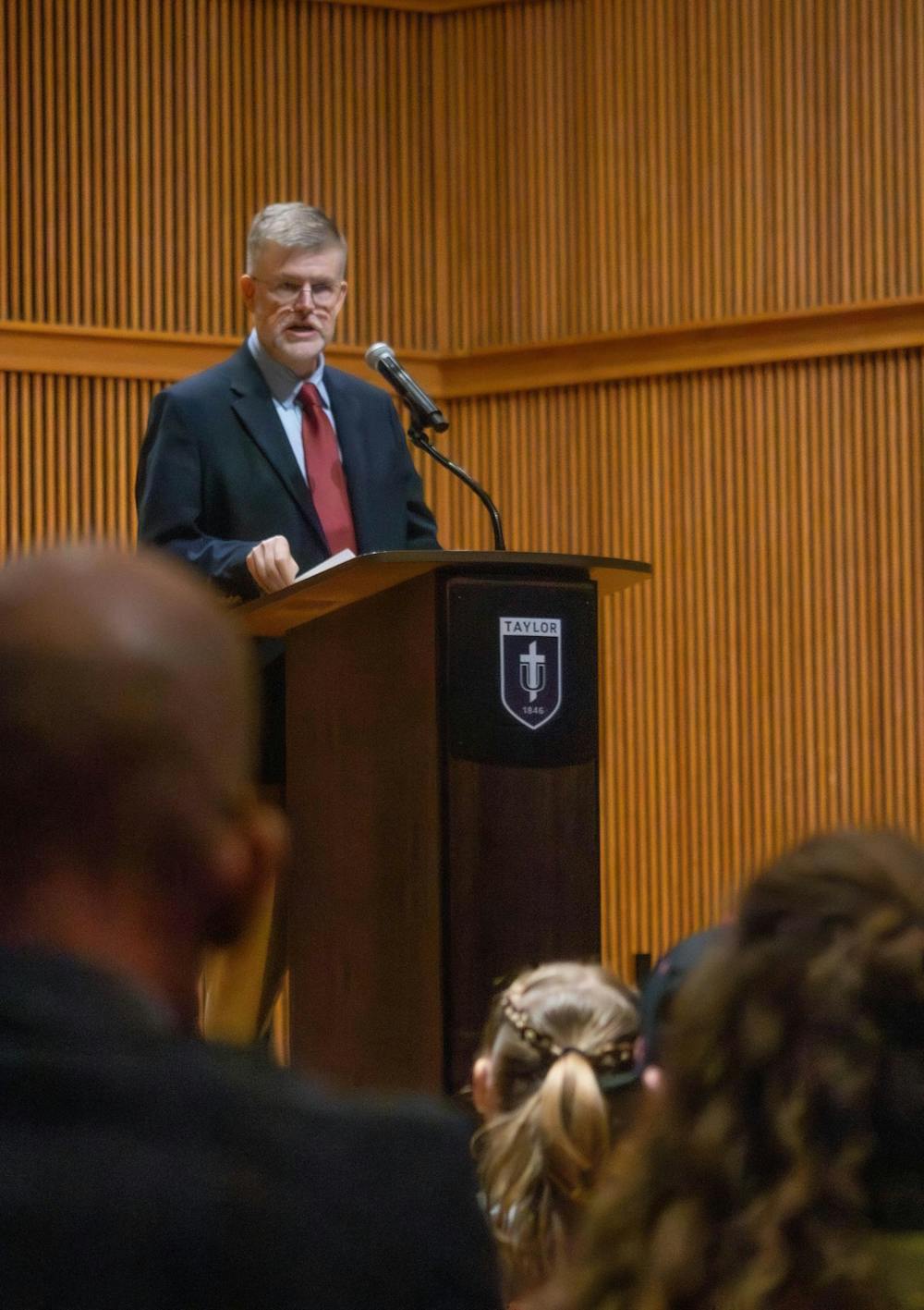Thomas Kidd, research professor of church history at Midwestern Baptist Theological Seminary, spoke on the faith of Thomas Jefferson and his complex relationship to Scripture on Oct. 23 for Taylor’s Halbrook Lecture in the Recital Hall.
The Halbrook Lecture is a lecture series run by the HGPS Department, dedicated to ensuring that all students at Taylor were civically informed.
Kidd, who previously taught at Baylor University, specializes in early American religious history and has written multiple books on the subject, including one on Jefferson and his faith. He has also written for outlets such as the Wall Street Journal and the Washington Post, and regularly writes for the Gospel Coalition.
Kidd was interested in the ambiguities of Jefferson’s faith and his relationship to the teachings of Christ.
Jefferson held a unique view of Christianity, Kidd said. Raised Anglican, he converted to a form of Unitarianism at college, which emphasized the material and rejected the supernatural, Kidd said.
Criticizing philosophers’ focus on the internal life, Jefferson instead believed that the purpose of both religion and Jesus’ teaching was to incentivize good behavior.
Rejecting the divinity of Christ, Jefferson instead held him in high regard as a great philosopher. He believed Jesus’ teachings to be “the most perfect and sublime teachings to ever exist,” engaging in study of comparative religion to prove his point.
Jefferson’s relationship with Scripture was more complex, Kidd said. He rejected the New Testament as corrupted by the ignorance of scribes and the passage of time, inaccurately reporting the teaching of Jesus. Influenced by fellow Unitarians Benjamin Rush and Joseph Priestley, Jefferson sought to reconstruct the words of Jesus by cutting up and pasting in individual verses to create his own Gospel, titled “The Life and Morals of Jesus of Nazareth.”
Jefferson’s Bible excised almost all miracles, the Incarnation and the Resurrection, although he retains many supernatural elements in Jesus’ words and parables, Kidd said.
The list of speakers asked to lecture is determined by Philip Byers, Halbrook Chair of Civic Engagement.
This decision is made in collaboration with other faculty members who provide input and advice on candidates, Byers said. Byers proposed inviting Kidd after learning how many professors used his books in class.
“I noticed that Dr. Wetzel has used Kidd’s work in American Religious History,” Byers said. “Dr. George has used his work in both her survey and then when she does stuff in colonial history. And then Dr. Jones has used his textbook. I was thinking while we’ve got this collection of students who are already encountering his work in other places, it would be wonderful to hear from him in person.”
Byers admires Kidd’s Christian approach to history, he said. This approach seeks the truth in all its complexity and refuses to write “puff pieces” on one’s subjects. This approach parallels the Old Testament’s honest approach, where the sins of figures such as King David are fully described rather than glossed over, Byers said.
Ian Penner, a senior history major, was introduced to Kidd’s work by Wetzel at the start of his studies, he said. Kidd taught several of Benjamin Wetzel’s classes at Baylor University and supervised his master’s thesis as well.
“I’ve actually been a big fan of Dr. Kidd for a while, kind of top three historians for me, because I’m an enjoyer of the American Revolution,” Penner said. “I actually got to get breakfast with him earlier this morning, actually. So, this is kind of like a hero moment, like you get to meet this guy you’ve been reading about.”
Penner often sees Kidd’s articles cited while researching early American history, he said.
He appreciated the expertise Kidd brought to his lecture, Penner said. Jefferson’s personal beliefs were highly polemicized between those arguing he was an atheist or an orthodox Christian.
Jefferson’s treatment of Scripture reveals the complexity of his religious stance, Penner said.
“It was really interesting to see how much nuance there was even in this thing that we think of as diametrically opposed,” Penner said. “I was told that, at least with the Jefferson Bible, that he took out all the miracles. And Dr. Kidd said that, no, he just took out very specific miracles. But the important thing is that he took out the resurrection and that’s something so crucial to the Christian faith that I think that really shows where he falls in this Christian/non-Christian perspective.”
This tension was a major focus of the lecture, with Kidd exploring the contradictory elements of Jefferson’s beliefs and stressing the importance of understanding Jefferson’s beliefs without assuming they fit into a modern-day box, Penner said.
Jefferson was both deeply familiar with the Bible, quoting it frequently, and deeply unorthodox in his views on the Resurrection and the divinity of Christ.
“And so you would think he either has to be just an atheist who doesn’t know much about Christianity or he has to be a devout Christian,” Kidd said. “But I’m saying he’s a third option that’s really surprising.”





